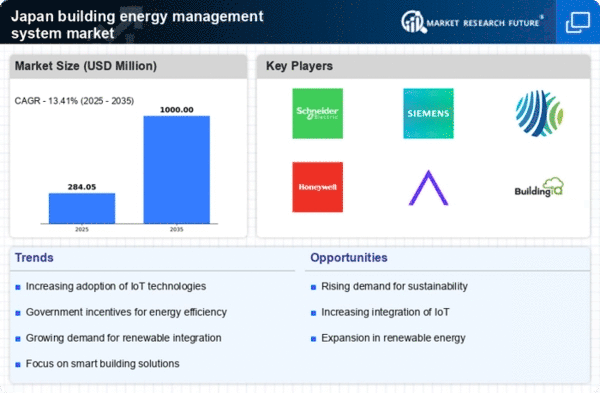Rising Energy Costs
The escalating energy costs in Japan are driving the demand for building energy-management-system market solutions. As energy prices continue to rise, businesses and property owners are increasingly seeking ways to optimize energy consumption and reduce operational expenses. The building energy management system market provides tools that enable real-time monitoring and analysis of energy usage, allowing for more informed decision making. In 2025, energy costs are projected to increase by approximately 15%, prompting organizations to invest in energy-efficient technologies. This trend indicates a growing recognition of the financial benefits associated with energy management systems, which can lead to substantial savings over time.
Focus on Sustainability
The growing emphasis on sustainability in Japan is a key driver for the building energy-management-system market. As consumers and businesses alike become more environmentally conscious, there is a heightened demand for solutions that minimize energy waste and promote sustainable practices. In 2025, it is estimated that 70% of Japanese companies will prioritize sustainability initiatives, leading to increased investments in energy management systems. These systems not only help organizations reduce their environmental impact but also improve their public image and competitiveness. Thus, the focus on sustainability is likely to propel the building energy-management-system market forward.
Technological Advancements
Technological advancements play a crucial role in shaping the building energy-management-system market. Innovations in IoT, AI, and machine learning are enhancing the capabilities of energy management systems, allowing for more sophisticated data analysis and predictive maintenance. In Japan, the integration of these technologies is expected to increase system efficiency by up to 30% by 2026. This improvement not only optimizes energy usage but also contributes to sustainability goals. As organizations strive to modernize their infrastructure, the demand for advanced energy management solutions is likely to grow, further propelling the building energy-management-system market.
Increased Regulatory Pressure
In Japan, regulatory pressure regarding energy efficiency and emissions reduction is intensifying, significantly impacting the building energy-management-system market. The government has implemented stringent regulations aimed at reducing carbon footprints and promoting sustainable practices. By 2025, it is anticipated that compliance with these regulations will require a 20% reduction in energy consumption for commercial buildings. This regulatory landscape compels organizations to adopt energy management systems that facilitate compliance and enhance operational efficiency. Consequently, the building energy-management-system market is poised for growth as businesses seek solutions to meet these evolving regulatory demands.
Integration of Renewable Energy Sources
The integration of renewable energy sources into building operations is becoming increasingly prevalent in Japan, significantly influencing the building energy-management-system market. As the country aims to achieve its renewable energy targets, the demand for systems that can effectively manage and optimize the use of solar, wind, and other renewable sources is rising. By 2025, it is projected that renewable energy will account for 30% of Japan's total energy consumption. This shift necessitates advanced energy management solutions that can seamlessly integrate with renewable technologies, thereby driving growth in the building energy-management-system market.
















